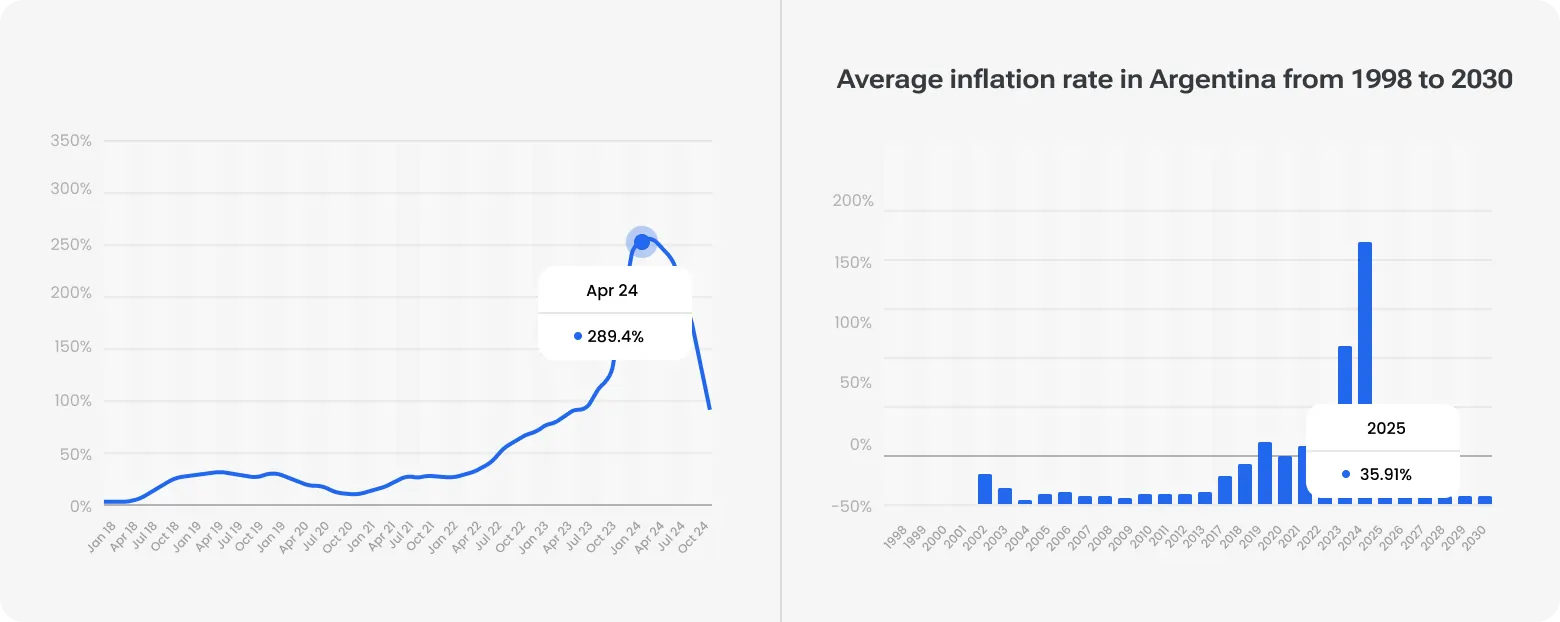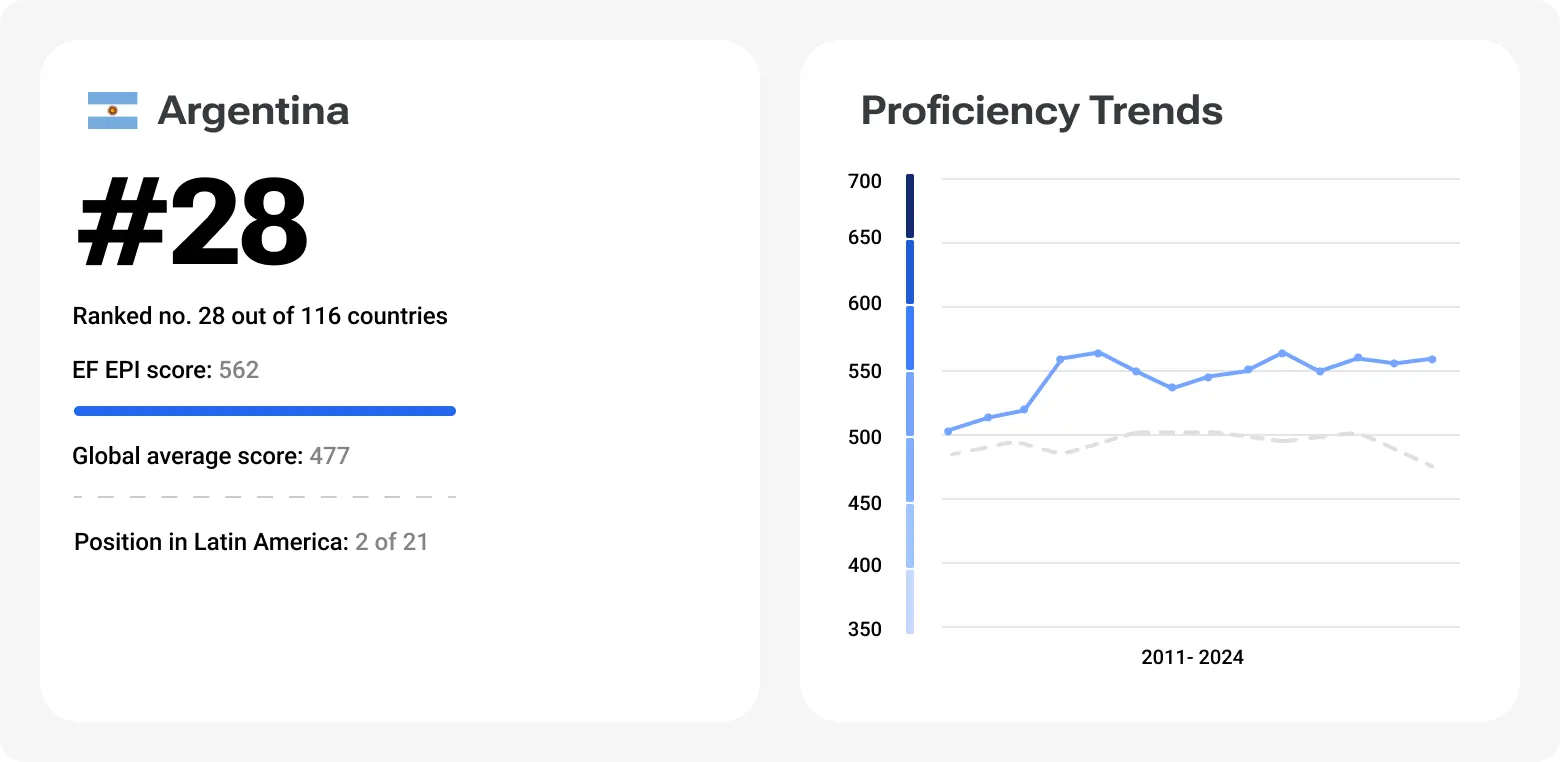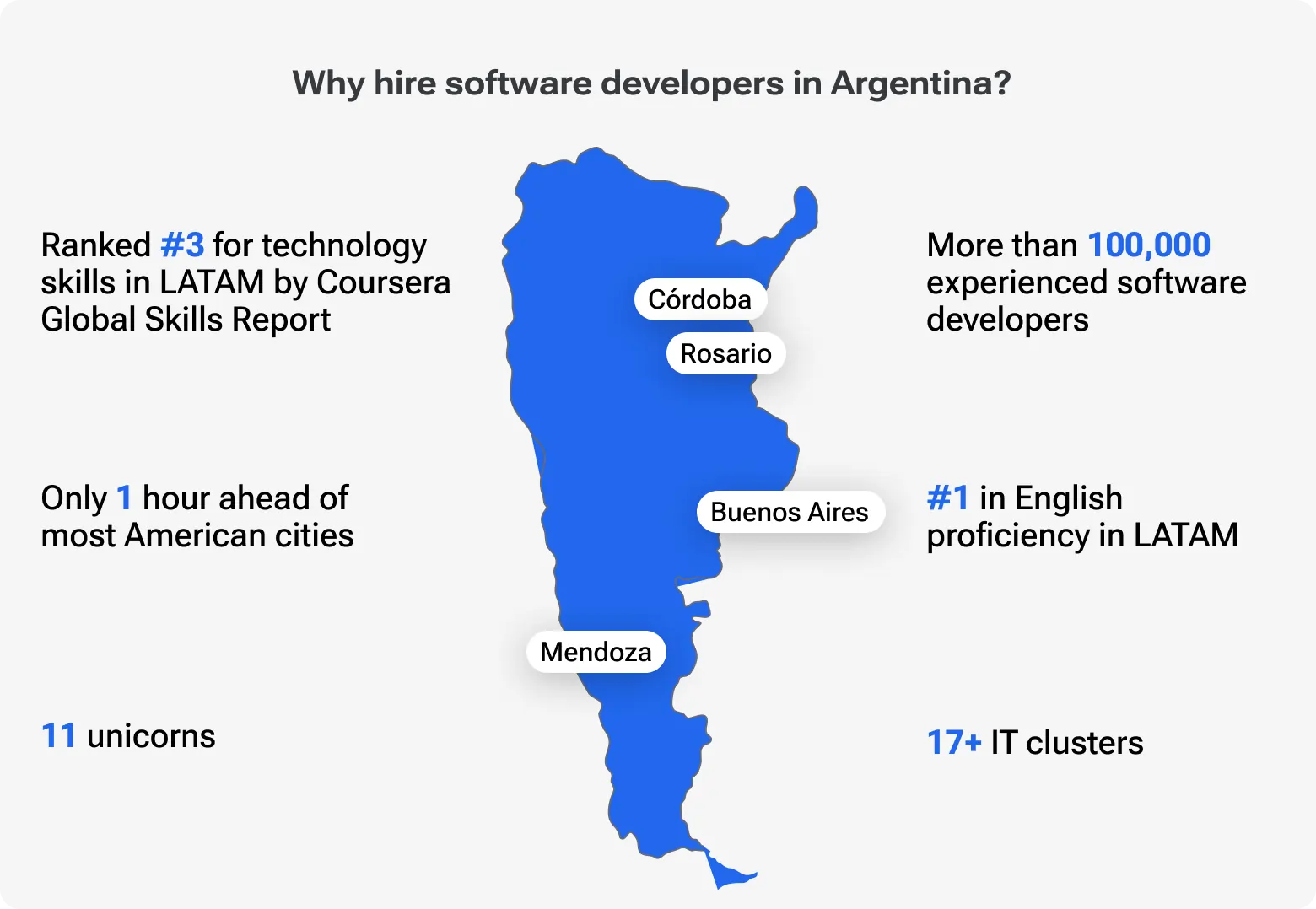The past three to four years marked the appearance of new markets for software development. Argentina is gaining ground among them as a compelling option. And really, the country has everything for success: skilled remote software developers, convenient time zones, and cost advantages.
However, you can’t enter the waters twice. So, before diving, you should understand the local market. This way, you won’t encounter overspending or inappropriate fleur from the software development outsourcing.
What should you consider when developing an outsourcing strategy in Argentina?
-
Developer average hourly rates
-
Find the right balance in experience level, technology stack, and engagement model
-
Size up other outsourcing destinations
-
Include key factors influencing pricing
Strategic decisions begin with considering all the nuts and bolts.
Motivated and focused devs for up to 60% less than locals, delivered in days, not months
Understanding software developer rates in Argentina (2025 update)
Argentina’s software outsourcing market in 2025 reflects a mix of challenges and opportunities. Inflationary pressures, exchange rate changes, and heightened global competition for skilled talent all influence developer rates.
Hourly rates by experience level
Important note: The Argentine currency can fluctuate significantly against the dollar even within a single month:
Junior developers (0-1 year): USD 18/hour.
Mid-level developers (1-4 years): USD 25/hour.
Senior developers (5+ years): USD 45/hour.
The figures represent the median rates across the industry.
In-house devs: Monthly salary
When hiring Argentinian developers, you should take into account future fluctuations more accurately. Alternative — pay in dollars; almost all companies are flexible about payment matters.
Junior developers: USD 2,500/month.
Mid-level developers: USD 3,000/month.
Senior developers: USD 4,000+/month.
Freelancers vs. outsourcing companies
The most common hesitation is the hiring/engagement model. There are cost differences between freelancers and outsourcing companies.
Freelancers: USD 25 to USD 45/hour.
Outsourcing companies: USD 48 to USD 65/hour.
But you should notice that outsourcing companies are more organized and take on much bigger loads. This is not to mention additional services (quality assurance, extra consulting, and others).
Rates by tech stack
The more popular and complex the programming language or framework is, the higher the rates, obviously:
JavaScript (React.js, Node.js): USD 35 - USD 50/hour.
Python: USD 35 - USD 55/hour.
Java: USD 30 - USD 40/hour.
.NET: USD 30 - USD 50/hour.
Ruby: USD 40 - USD 55/hour.
PHP: USD 40 - USD 55/hour.
Argentina’s outsourcing rates: “Value-driven-er” than other destinations
Argentina offers competitive outsourcing rates that strike a balance between affordability and quality. While not always the lowest globally, the combination of moderate costs, strong technical expertise, and cultural alignment often delivers greater overall value than purely low-cost destinations.
Hourly rate comparison by region
Region
Average hourly rate
What else should you weigh up
Undoubtedly, cost is a significant factor. However, it doesn’t imply a flawless job. Consider the following:
Time zone: Argentina’s time zone closely aligns with the US — no limits for effective collaboration.
Cultural compatibility: Geographical closeness creates shared cultural values and work ethics. This works, at least in a business environment.
Language proficiency: Argentina ranks 28th in the global English Proficiency Index. Just compare with India (69th) and Ukraine (40th). We have nothing against the mentioned countries (especially considering the Ukrainian Devico’s office), but Argentina is still recognized globally as an international outsourcing partner with high communication skills. Particularly because of the English level.
All you need to know about outsourcing software development to Argentina
What influences rates in Argentina
The affordability of hiring in Argentina is no coincidence. Rates are determined by a mix of economic factors such as inflation and exchange rates, along with talent supply or demand for specific skills.
Inflation and exchange rates
We have already mentioned the nuances of Argentina’s economic landscape, especially inflation and currency volatility. In 2024, the country experienced an inflation rate of more than 280%, which decreased to about 36% by April 2025.
The Argentine peso has also seen depreciation, with the USD/ARS exchange rate increasing by 14.6% in 2024. This currency fluctuation affects the real Argentina software outsourcing costs as payments in USD can become more expensive over time.
What local government offers for foreign investors
The Incentive Regime for Large Investments (RIGI) offers tax benefits (35% → 25%), accelerated VAT refunds, exemptions from certain taxes, and legal certainty to foreign investors. Does it offset some of the risks associated with economic instability? More of a yes than a no, especially for those who plan to nearshore software development in Argentina.
Talent availability and demand
The country invests in education, especially in private one. That’s why you can likely find specialists to your liking. The labor force participation rate is 62%, covering 31 urban areas. Argentina’s IT market is projected to reach USD 3.31B by the end of 2025 (annual growth rate of 1.14%).
Outsourcing strategy to Argentina should imply that high demand for niche-oriented developers (AI, blockchain, fintech, etc.) drives up salaries, and you may need to offer competitive compensation to attract top talent.
Return on investment: Argentina’s value prop
Argentina delivers strong ROI for companies seeking nearshore outsourcing. Lower salary expectations, strong education in STEM fields, and cultural compatibility with North American markets result in tangible ROI, making Argentina a strategic choice for scaling teams.
Real-time collaboration
The United States won’t encounter any difficulties in collaborating between teams with a very close time zone. So, synchronous communication, quicker feedback loops, and more efficient project management make Argentina a perfect destination for software development outsourcing.
High education standards = Skilled workforce
Argentina has an inconsistent educational system. While some of its universities rank among the top 10% best worldwide, some disciplines still screw. Yet, Argentine STEM-related universities produce about 27,000 software engineers annually. Foreign companies can count on this talent with complex software development projects.
English proficiency: Effective communication
Many Argentine developers possess strong English skills, no language barriers, and fewer misunderstandings. CEOs, CTOs, and tech leaders know that strong English proficiency eases off project management and aligns expectations.
Cost-quality balance in the long run
Argentina may not offer the lowest outsourcing rates globally, that’s true. But what if we say that you will actually pay less if you hire local devs?
Let’s do the math: skilled talent + favorable time zones + effective communication = higher productivity and better quality outcomes.
Continuing this equation, less rework and a robust product will impact your brand reputation. All this ensures a stronger return over the long term, as projects will likely scale with first successes.
Optimal engagement models for hiring Argentinian software developers
There is no one-size-fits-all approach to hiring in Argentina. Companies working with Argentinian talent typically choose among three models: staff augmentation, dedicated teams, and full project outsourcing.
Dedicated teams
What: Assembling a software development dedicated team that works exclusively on your project.
For whom: Long-term projects with stable requirements. Best for businesses contemplating long-term development endeavors or establishing a technology product gradually.
Benefits: Offers complete control over processes and resources, smooth communication, and increased retention.
Staff augmentation
What: An extension to your in-house team through additional developers with specific skills.
For whom: Projects requiring specialized expertise for a limited duration. Or projects with high security standards/requirements, but also with some budget limitations. This means you can’t outsource the project completely, but with staff augmentation you still can optimize spending without compromising your security policies.
Benefits: If you need to fill skill gaps quickly without a long-term commitment, this is your perfect choice.
Project-based outsourcing
What: The outsourcing partner completely takes over the project, from specifications to the final result.
For whom: Startups or businesses with short-term needs. You may save money and definitely get access to specialized skills without micromanaging external teams.
Benefits: Effective approach for clear project goals and a limited scope.
Freelancers vs. agencies
Hiring freelancers can be cost-effective for small, well-defined tasks. Yet, it also has its challenges: varying quality and less accountability. On the other hand, agencies provide a structured approach with access to a team of professionals, ensuring quality and reliability, albeit at a higher cost.
Vetting software developers in Argentina: Where to find, how to test
Where to find talent
Outsourcing firms: Companies like Devico specialize in connecting businesses with top Argentinian developers. You can book a consultation to find out how the specific provider can help you. At Devico, such consultations are free of charge.
Freelance platforms: Freelancer.com, Upwork, and Fiverr provide many Argentinian freelancers across various specialties.
Job boards: Leverage local platforms like Bumeran and Computrabajo — popular for posting job vacancies and searching for potential candidates.
Tech communities: The word of mouth has always been a leg-up in searching for potential partnerships. Also, consider visiting in-person local meetups in Buenos Aires and other big hubs.
Evaluating expertise
-
Portfolio review: Check previous projects, gauge developers’ experience, and whether the team is suitable for your project.
-
Coding tests: Common practice: a technical assessment to evaluate problem-solving skills and proficiency in relevant technologies. But note that this one might come with some charges.
-
Client reviews: Ask for feedback from previous clients to understand the company’s reliability and work ethic.
Legal and contract considerations
-
Non-disclosure agreements (NDAs): Ensure confidentiality of sensitive information by having developers sign NDAs.
-
Intellectual property protection: Clearly define IP rights in contracts to safeguard your creations.
-
Payment structures: Establish clear payment terms, including milestones and deliverables, to avoid disputes.
Conclusion
While software developer rates in Argentina might be slightly higher than in destinations like India or Ukraine, this location offers other unmatched advantages.
English proficiency, time zone alignment, mindset, and responsiveness of local teams — chances are, this is worth your bid.
The best possible strategy is having a local tech buddy who knows the market inside out and can negotiate fair rates and appropriate quality. Devico offers such assistance to develop an outsourcing strategy in Argentina.
Contact now for a free 1-hour call.
Tap into Devico’s tech expertise with a time-to-market advantage and up to 50% budget savings






